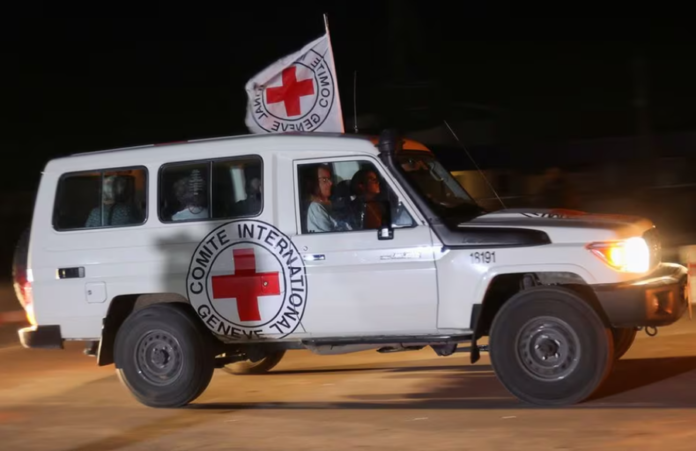Hamas fighters released 24 hostages on Friday during the first day of the war’s first truce, including Israeli women and children and Thai farm workers, after guns fell silent across the Gaza Strip for the first time in seven weeks, according to Reuters.
The hostages were transferred out of Gaza and handed over to Egyptian authorities at the Rafah border crossing, accompanied by eight staff members of the International Committee of the Red Cross (ICRC) in a four-car convoy, the ICRC said.
Qatar, which acted as mediator for the truce deal, said 13 Israelis had been released, some with dual nationality, plus 10 Thais and a Filipino. Thirty-nine Palestinian women and children detainees were released from Israeli jails.
“We have just completed the return of the first batch of our hostages. Children, their mothers and other women. Each and every one of them is a world in itself,” Prime Minister Benjamin Netanyahu said. “But I stress to you, the families, and to you, citizens of Israel: We are committed to returning all our hostages.”
The Israeli hostages released included four children accompanied by four family members, and five other elderly women.
The Israeli military said the released hostages underwent a medical assessment inside Israeli territory before being taken to hospitals to be reunited with their families.
Under the terms of the four-day Israel-Hamas truce, 50 women and children hostages are to be released in return for 150 Palestinian women and children among thousands of detainees in Israeli jails. Israel says the truce could be extended if more hostages are released at a rate of 10 per day.
Those released on Friday were exchanged for 24 jailed Palestinian women and 15 teenagers. In at least three cases, before the prisoners were released, Israeli police raided their families’ homes in Jerusalem, witnesses said. Police declined to comment.
A source briefed on the negotiations said the release of the Thai workers, who were all men, was unrelated to the truce talks and followed a separate track mediated by Egypt and Qatar.
Thai and Filipino farm workers employed in southern Israel were among around 240 hostages taken to Gaza by gunmen when Hamas fighters launched a killing spree on October 7.
Thai Prime Minister Srettha Thavisin said on social media that 12 Thai workers had been freed, two more than the figure given by the Qataris. No reason for the discrepancy was given.
U.S. President Joe Biden said there was a real chance of extending the truce and that the pause in fighting was a critical opportunity to get humanitarian aid into Gaza.
Germany’s Foreign Minister Annalena Baerbock said four of those released held German nationality.
“The ceasefire must last as long as possible now to ensure the people of Gaza receive vital goods like medicine, food, water and aid,” she added.
Earlier on Friday, combat between Israeli troops and Hamas fighters halted for the first time in seven weeks.
No big bombings, artillery strikes or rocket attacks were reported, although Hamas and Israel both accused each other of sporadic shootings and other violations. Both said the war would resume on full throttle as soon as the truce was over.
In Khan Younis in southern Gaza, people ventured out of homes and shelters into a landscape of buildings reduced to rubble. Displaced families carried belongings in plastic bags, hoping to return at least temporarily to the homes they had abandoned.
The U.N. humanitarian office (OCHA) said 137 trucks of goods were offloaded in Gaza on Friday, the biggest humanitarian convoy received since Oct. 7.
Hamas confirmed all hostilities from its forces would cease. But Abu Ubaida, spokesperson for Hamas’ armed wing, said in a video message that this was a “temporary truce” and called for an “escalation of the confrontation … on all resistance fronts”, including the Israeli-occupied West Bank.
Israeli Defence Minister Yoav Gallant spoke similarly: “This will be a short pause, at the conclusion of which the war (and) fighting will continue with great might and will generate pressure for the return of more hostages.”
According to Israeli tallies, Hamas fighters killed 1,200 people and seized about 240 hostages when they burst across the border fence into southern Israel on October 7. Since then, Israel has rained bombs on the Hamas-ruled enclave, killing some 14,000 Gazans, around 40% of them children, according to Palestinian health authorities.
Hundreds of thousands of Gaza’s 2.3 million people have fled their homes, including most people in the northern half of the enclave.
Residents said the Israelis had dropped leaflets warning people not to travel back to the north, and have fired over the heads of some people trying to get back into Gaza City, which Israel ordered evacuated and has pulverised in its ground assault.
James Elder, spokesperson for the U.N. children’s agency UNICEF, said from southern Gaza that the agency was pleading for the truce to be made permanent. “We cannot in all decent conscience go from a four or five day pause into killing of children again.”


